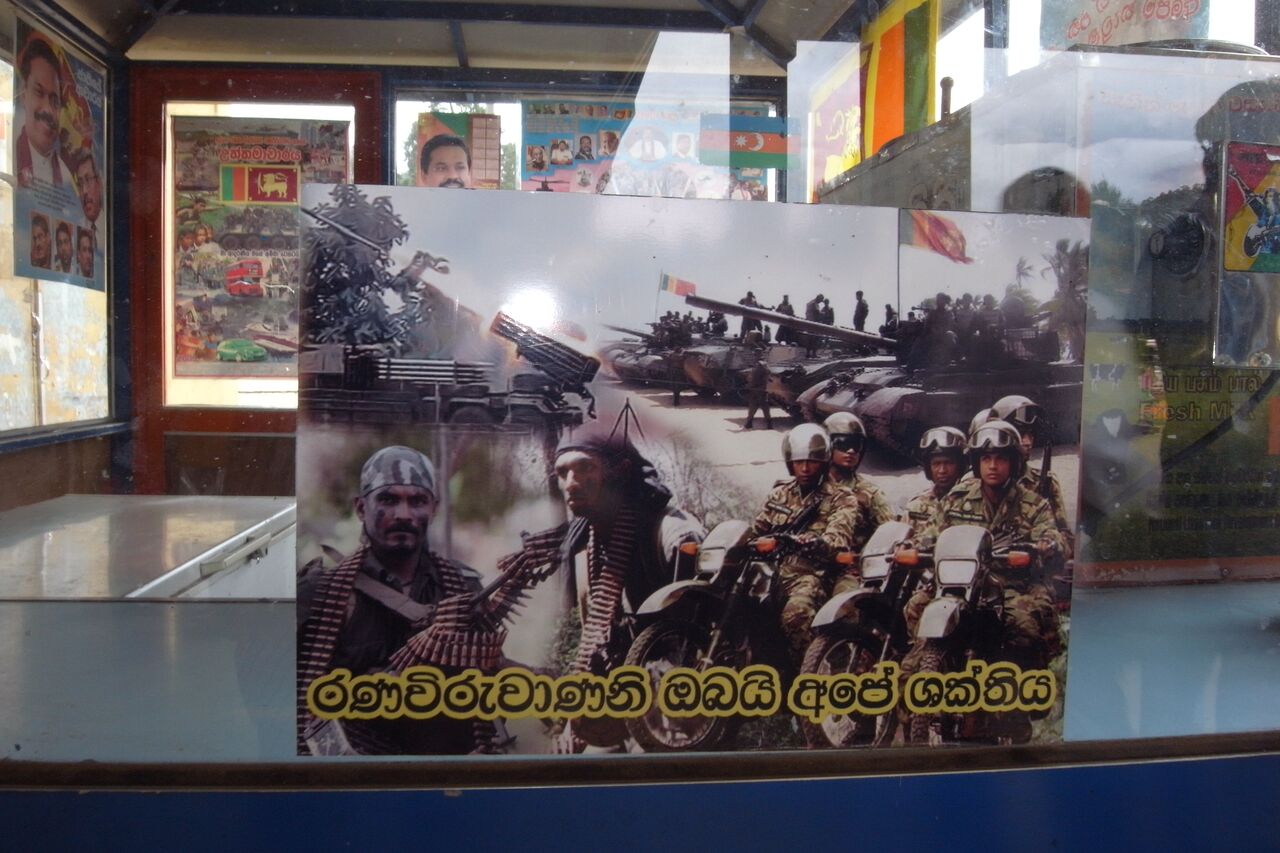|
A poster seen in a Sri Lankan window in 2009. Photograph courtesy of Robin Bell - Bell Visuals |
definition: a statement of the meaning of a word
accountable:
required or expected to justify actions or decisions;
responsible.
authority:
the power or right to give orders, make decisions, and enforce obedience;
a book or other source able to supply reliable information or evidence.
border:
form an edge along or beside;
be close to an extreme condition.
broken:
fractured or damaged;
disrupted;
spoken falteringly, as if overcome by emotion.
community:
a similarity or identity;
joint ownership or liability.
conflict:
an incompatibility between two or more interests;
a clash of opposing wishes or needs.
constitution:
a body of fundamental principles;
the composition of something;
one’s physical state with regard to vitality, health, and strength.
contradiction:
a situation in which inconsistent elements are present;
the statement of a position opposite to one already made.
defeat:
reject or block;
overcome;
be impossible for someone to understand.
diaspora:
the dispersion of any people from their original homeland.
die:
become extinct;
be forgotten.
difference:
the remainder left after subtraction of one value from another.
disappear:
cease to be visible;
cease to exist or be in use;
or cause to disappear, as by consumption.
equal:
considered to be the same as another in status or quality.
ethnic:
denoting origin by birth or descent rather than by present nationality.
fact:
the truth about events as opposed to interpretation.
flight:
the movement or trajectory of a projectile through the air;
the action of fleeing or attempting to escape;
a series of steps between floors or levels.
foreign:
coming or introduced from outside;
characteristic of a country or language other than one's own.
goal:
an aim or desired result.
a point marking the end of a race.
govern:
control, influence, or regulate.
grab:
a quick, sudden clutch or attempt to seize;
a frame of video, stored as a still image for subsequent display.
guard:
watch over someone to prevent them escaping;
protect against damage or harm;
stay close to an opponent.
hero:
central character, with whom the reader is expected to sympathize.
impunity:
freedom from the injurious consequences of an action.
involvement:
the fact of participating in something.
justice:
the quality of being fair and reasonable.
land:
an area of ground, especially in terms of its ownership or use;
succeed in obtaining or achieving something;
go ashore.
liberation:
freedom from limits on thought or behavior.
majority:
the greater number.
mechanism:
a system of parts working together in a machine;
a contrivance in the plot of a literary work.
minority:
a relatively small group of people.
nation:
a large aggregate of people united by common history, culture, language.
neighbor:
be situated next to or very near.
occupy:
take control of a place by military conquest or settlement;
enter, take control of, and stay in forcibly, as a form of protest.
official:
having the approval or authorization of an authority or public body.
oppression:
prolonged cruel or unjust treatment or control.
peace:
freedom from violence;
freedom from disturbance;
quiet and tranquility.
question:
a matter forming the basis of a problem requiring resolution;
feel or express doubt about;
raise objections to.
radical:
far-reaching or thorough;
affecting the fundamental nature of something;
relating to the root of something.
reconciliation:
the restoration of friendly relations;
the action of making one view or belief compatible with another.
rehabilitate:
restore to former privileges after a period of official disfavor;
return to its former condition.
self-determination:
the freedom to make your own choices;
determination by the people of a territorial unit of their own future political status.
signal:
an apparatus on a railroad notifying trains
of whether or not the line is clear;
an indication of a state of affairs.
tactic:
an action or strategy carefully planned to achieve a specific end.
victim:
a person harmed, injured, or killed.
warning:
advance notice of something.
watch:
carefully observing something over a period of time.
weapon:
a means of gaining an advantage or defending oneself in a conflict.
weep:
shed tears;
mourn for.
when:
at what time;
considering that.
where:
in or from what source;
in what direction or respect.
whose:
belonging to or associated with which persons.
wind:
a current of air blowing from a particular direction;
used in reference to an influence or tendency that cannot be resisted.
witness:
see an event, typically a crime or accident, take place;
give or serve as evidence of;
be present as someone signs a document.
word:
a person's account of the truth, especially when it differs from another’s;
speech as distinct from action;
a promise or assurance;
a message.
-----
This poem is a "found poem." All of the definitions are phrases from online dictionaries. Most of them are from the first search result when I Googled for definitions.
-----
I am an Eelam Tamil poet.
In Tamil, my name was the one first given to Aandal, the only woman among the twelve Alvar poet-saints. Pronounced differently in Bengali, my name is a word that means "where."
I dedicate my work to past, present, and future Eelam Tamils around the world.
Kothai

